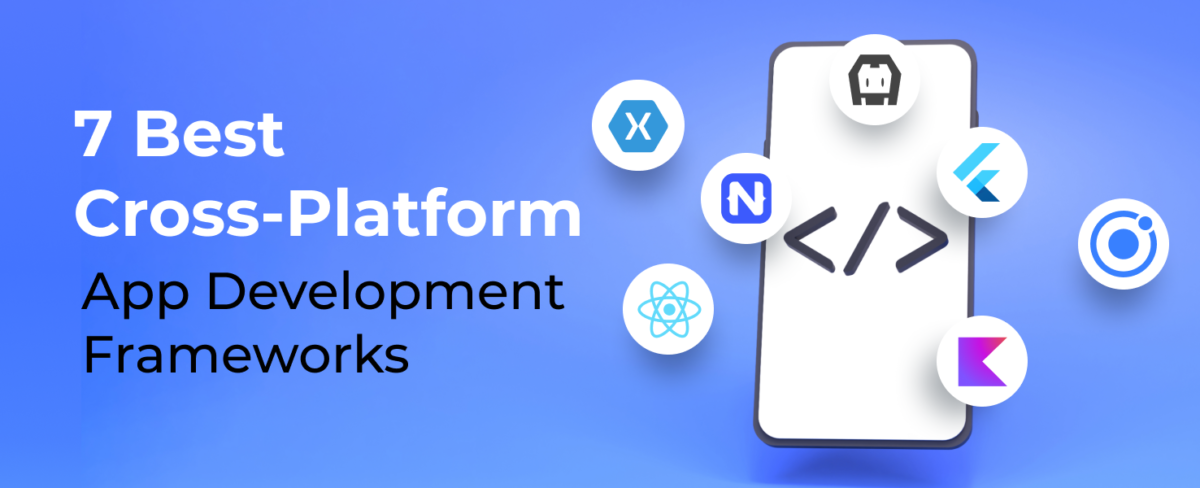Choosing the optimal cross-platform development framework has never been easy. In this article, S-PRO experts will overview the best cross-platform app development frameworks. These insights will help you choose the most suitable one for your future mobile app.
What Is A Cross-Platform App Development Framework?
A cross-platform framework is a set of tools developers use to build mobile applications for multiple platforms.
Developers can put business logic into code once and reuse this code for different platforms. The trick is that they extend it with pieces of native-like code. To do it, they need cross-platform development frameworks like Flutter, React Native, and Xamarin.
Ultimately, you can deploy an app to iOS, Android, and other platforms like OS for smart TVs from a single codebase.
Ace Mobile Application Development with S-PRO
Whenever you need assistance with mobile software development, the S-PRO team can get you covered.
We offer a wide range of mobile development services:
- iOS and Android native development
- Cross-platform app development
- Architecture and backend development
- Digital product design
- Strategic consulting
On top of that, we can help you with CI/CD, cloud services, and blockchain solutions. Let S-PRO be your trusted partner for your mobile development projects.
Best 7 Cross-Platform Mobile App Development Frameworks
Here is the list of the top cross-platform mobile app development frameworks. Let’s look at each of them in more detail.
Flutter
Flutter is currently the most popular cross-platform development framework. Together with React Native, it is one of the frameworks we at S-PRO use in our projects.
Flutter allows bringing pieces of native-like code into the Dart codebase. Thanks to its powerful graphic and rendering engine, Flutter apps boast excellent performance. However, they take up much device space. Also, it’s worth noting that the Flutter framework requires specialized knowledge.
React Native
React Native (RN), a JavaScript-based framework, is one of the easiest to adopt. Cross-platform development has never been easier, and RN’s proactive community is a testament to that. Its members are always ready to help with any problems you may encounter on development forums.
This framework allows for rapid code editing with useful built-in features. For example, “hot reloading” updates only the part of an app with modified code, while “live reloading” refreshes the entire app.
Xamarin
Xamarin is a suitable option if you need to reuse C# code for building a cross-platform app.
Xamarin provides access to the full power of the .NET framework and supports Azure cloud services. It also allows engineers to share up to 90% of app code, which can significantly reduce development time and effort.
Cordova
The Cordova framework allows for the building of native-like cross-platform apps using a web development stack.
With knowledge of HTML, CSS, and JavaScript, developers can quickly become familiar with Cordova and begin building apps. This makes it one of the best cross-platform app development frameworks for a quick start.
Ionic
Ionic is a great option for products developed with JavaScript, as it is based on the AngularJS and Cordova frameworks. However, it has an additional layer of UI components that give Ionic an advantage over plain Cordova.
If you are using the latest version of Ionic, you can combine it with React, Angular, or Vue.js frameworks to access more libraries and speed up the development process.
NativeScript
NativeScript is another solution with high performance and integration potential. Released in 2015, it is one of the younger yet competitive cross-platform frameworks.
Although NativeScript combines the strengths of JavaScript, TypeScript, and Angular, it has some potential pitfalls. In particular, it can struggle with interpreting HTML and the DOM, making it challenging to render non-standard UI components.
Kotlin Multiplatform
Kotlin Multiplatform is a cross-platform framework that uses the Kotlin programming language and has backward compatibility with Java.
It is a native app-builder for Android, making it the best choice if Android app development is your primary goal. Among its cons, we can mention immature iOS components and relatively high development costs.
Conclusion: How To Choose Cross-Platform Mobile Development Framework For Your App
In this article, we overviewed the seven best cross-platform app development frameworks, including React Native, Xamarin, Flutter, Ionic, Cordova, and Kotlin Multiplatform. As you see, whichever programming language you plan to use on the backend, you will always find a suitable framework for your project.
If you want to develop a mobile app for your business, S-PRO would like to lend you a hand. Our team of skilled developers will help you build a custom mobile application satisfying all your needs.
Whether you require to build a native or a cross-platform app, we have all the necessary expertise to create it from scratch. We will cover every step of software development to ensure your project’s success.
Contact S-PRO today to learn more about cross-platform app development and bring your mobile app idea to life.



